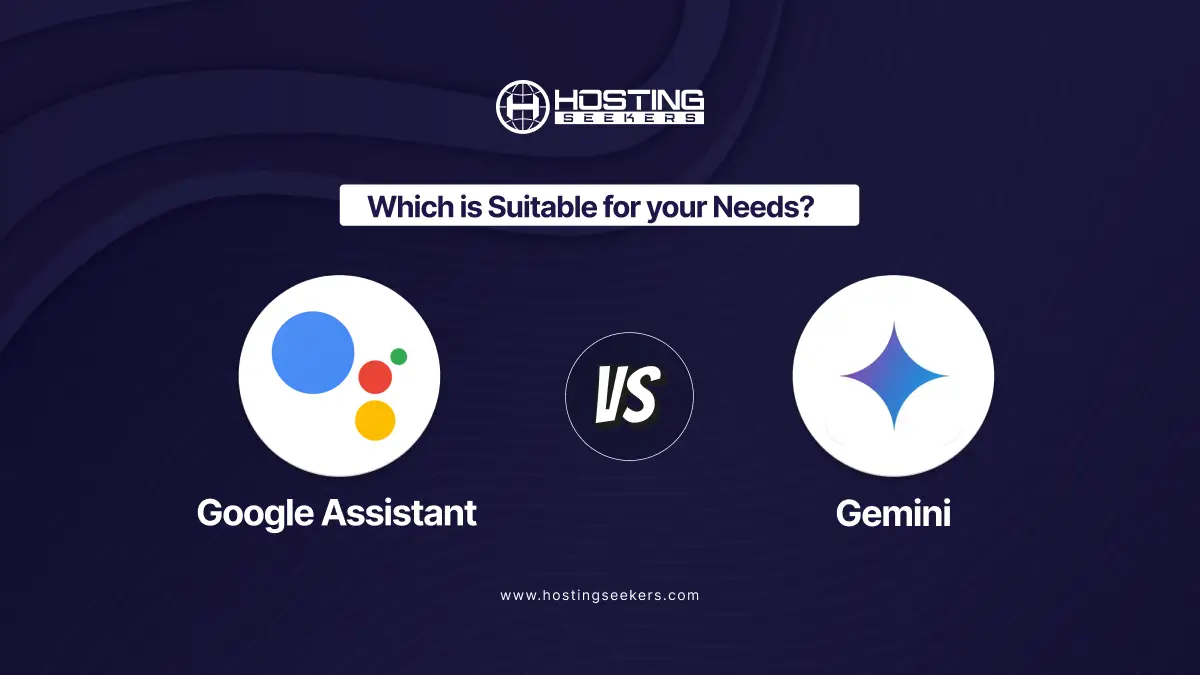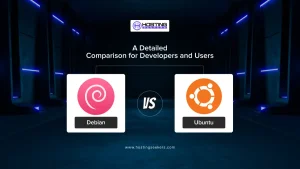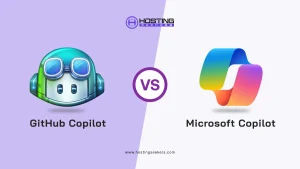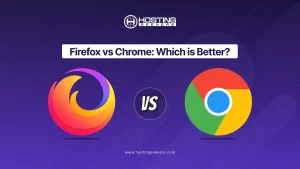
Google Assistant vs Gemini: Which is Suitable for your Needs?
Comparison Published on Date: April 3rd 2025Table of Content
With technological advancement, Artificial Intelligence (AI) has become an integral part of our daily lives. AI assistants play a vital role in our lives by making our routine tasks easier daily.
AI has revolutionized the way we interact with technology. AI assistants can easily manage our schedules, control smart home devices, answer our doubts, and perform many more tasks.
Among the most popular AI assistants, Google Assistant and Gemini are quite common. Both are developed by Google to make our day-to-day lives easier.
The main purpose of this blog is to provide a detailed comparison of these two by highlighting their features, capabilities, and differences to help you decide which one suits your needs best.
What is Google Assistant?
Google Assistant is a powerful AI assistant that was launched in 2016. Its main purpose is to help users perform a variety of tasks using voice commands or text inputs.
The Key Features of Google Assistant are:
Voice Commands: Users can use natural language to interact with Google Assistant, which makes it easy to ask questions or give commands.
Smart Home Control: Google Assistant can seamlessly control a wide range of smart home devices like lights, thermostats, security systems, and other smart appliances.
Reminders and Calendar Management: Users can set reminders, schedule their appointments, and manage their calendars easily with Google Assistant.
Search Functionality: Google Assistant can provide answers to your questions, perform web searches, and retrieve information from various sources, saving you time researching.
Integration with Google Services: It easily integrates with other Google services like Gmail, Google Calendar, Google Maps and others to enhance its functionality.
Common Use Cases of Google Assistant:
Google Assistant is a versatile tool, and it can be used in various scenarios, like the following:
- Users can command, “Hey Google, turn on the AC,” and the assistant will execute the command.
- You can set alarms and reminders like, “Remind me to visit a doctor at 4 PM” or “Set the Alarm of 6 AM”.
- You can ask various questions like, “How is the weather today?”, “What is the recipe of cheesecake?”.
Integration with Third-Party Apps:
One of the excellent features of Google Assistance is its capability to integrate with various Google services and third-party applications. This allows users to access their emails, manage their schedules and even control smart devices. This feature is time saving and efficient in order to manage the routine work.
What is Gemini?
Gemini is Google’s AI assistant model; it is designed to enhance the capabilities of its predecessor, Google Assistant. It was launched in late 2023. Gemini aims to provide a more advanced and intuitive user experience.
Key Features of Gemini are:
Enhanced Contextual Understanding: Gemini can understand the context better. It allows for more natural conversations and follow-up questions.
Improved Voice Recognition: Gemini has advanced voice recognition capabilities that make it more accurate in understanding diverse accents and speech patterns.
Multimodal Interaction: Gemini also supports visual inputs, allowing users to interact via images and videos. More simply, you can upload a picture on Gemini and ask about that image.
Personalized Recommendations: The AI assistant learn from user interaction and tries to provide tailored suggestions and responses.
While Google Assistant is a robust tool, Gemini is a step further due to its more advanced AI algorithms. This results in more intuitive user experience with the ability to handle complex queries and provide users with relevant answers.
What are The Key Differences between Google Assistant and Gemini?
Voice Recognition & AI Capabilities
Both Google Assistant and Gemini are excellent in voice recognition. But with advancements in AI capabilities, Gemini understands the context better, making the interaction seamless and fluent. For example, if you ask Gemini, “What’s the weather today?” followed by “What about tomorrow?”, it can accurately interpret that you are asking about the weather for the next day.
Smart Home Integration
In terms of smart home integration, both assistants can control a wide range of devices. However, Gemini with its improved contextual understanding, allows us to handle more complex commands. For instance, if you command, “Turn on the lights and set the thermostat to 32 degrees”, then Gemini will execute both the tasks seamlessly.
Productivity and Utility
Both the assistants can manage tasks, set reminders, and schedule appointments. However, Gemini’s personalized recommendations and enhanced contextual understanding make it more effective in helping users to stay organized and productive.
Search and Information Retrieval
When it is about search and information retrieval, Gemini provides more accurate and contextual answers as compared to Google Assistant. For instance, if you ask about a specific event, Gemini can not only provide you with the date and time but also with the related information like its location, significance and any historical piece of information if relevant.
Customization and Personalization
Both Google Assistant and Gemini offer customization options. But Gemini learns from user interaction to provide responses and suggestions according to users’ needs and preferences. It makes the user experience more engaging and relevant. For example, if you frequently ask about local restaurants, Gemini might proactively suggest various dining options based on your preferences.
Device Compatibility
Google Assistant is compatible with many devices, including smart phones, smart speakers, smart displays, and many other devices. Whereas Gemini is designed to work across various devices. However, Google is likely to expand Gemini’s reach to ensure that it can be used on as many devices as possible.
Comparison Table – Google Assistant Vs Gemini
| Features | Google Assistant | Gemini |
| Launch date | 2016 | Late 2023 |
| Voice recognition | Advanced voice recognition | Enhanced voice recognition with better accuracy and understanding of diverse accents |
| Contextual Understanding | Good contextual understanding | Improved contextual understanding for more natural conversations and follow-up questions |
| Multimodal interaction | Primarily voice based | Supports voice, text, and visual inputs (images/videos) |
| Smart home integration | Extensive compatibility with smart home devices | Improved integration with smart devices, allowing for complex commands |
| Task management | Can set reminders, manage calendars, and create to-do lists
|
Enhanced task management with personalized recommendations based on user behaviour |
| Search functionality | Provides answers and performs web searches | More accurate and contextual answers, with proactive suggestions |
| Personalization | Basic personalization options
|
Advanced personalization based on user interactions and preferences |
| Integration with Google services | Seamless integration with Google services (Gmail, Calendar, Maps)
|
Also integrates with Google services, but with enhanced contextual awareness |
| Third-party app integration | Extensive support for third-party apps
|
Growing support for third-party apps, but may be limited initially |
| Device compatibility | Compatible with a wide range of devices (smartphones, speakers, TVs) | Designed for compatibility across various devices, but may have limited initial support |
| User experience | Reliable and user-friendly
|
More intuitive and engaging user experience with advanced AI capabilities |
| Privacy controls | Offers privacy settings and controls
|
Expected to have similar privacy controls, with potential enhancements for user data management |
| Learning capability | Learns from user interactions over time | More advanced learning capabilities for personalized experiences |
| Voice activation | Activated by “Hey Google” | Activated by “Hey Gemini” (or similar phrase) |
| Availability | Widely available on most devices
|
Gradually rolling out, with potential limitations on availability initially |
| Use cases | Smart home control, reminders, search, music playback
|
Enhanced use cases with more complex interactions and proactive suggestions |
How to Turn Google Assistant Off?
If you don’t want to use Google Assistant or want to limit its functionality, you can turn Google Assistant off. Here is the step-by-step guide:
- On your smartphone, locate & open the Google app.
- Tap on your profile picture or the “More” option at the bottom right corner, then select “Settings”.
- In the Settings menu, find & tap on “Google Assistant”.
- Scroll down to the “Assistant Devices” section, select your device, and toggle off the switch for Google Assistance.
If you just want to limit Google Assistant’s functionality, you can do this by:
- Disabling the “Hey Google” voice activation feature in the settings.
- To restrict the permissions, go to your device settings and limit the permissions granted to Google Assistant, such as access to your location, contacts, or mail.
How to Activate Google Assistant?
If you are new to Google Assistant or have reset all the settings of your devices, you can activate Google Assistant by the following manners:
On Android devices:
- Open the Google app.
- Tap on the profile photo, then “more,” and then select “settings”.
- Click on “Google Assistant” and then follow the prompt to set it up.
On iOS devices:
- Download the Google Assistant app from the App Store.
- Open the app & sign in with your Google account.
- Follow the on-screen instructions to complete the setup.
Conclusion
On the contrary, both the Google Assistant and Gemini offer unique features and capabilities that cater to the users’ needs at its fullest. Google Assistant is a well-established AI assistant with a wide range of functionalities, whereas Gemini resonates with the next generation of AI technology that provides enhanced contextual understanding and personalization.
Frequently Asked Questions (FAQs)
Q 1. What can Google Assistant do that Gemini can’t?
Ans. Google Assistant can handle routines and integrate with Google services better than Gemini (currently).
Q 2. Should I switch to Gemini from Google Assistant?
Ans. It solely depends on your needs, whether you want advanced AI features or are satisfied with the Google Assistant functionality.
Q 3. Which is better – Bixby vs Gemini?
Ans. Bixby excels at Samsung device control (e.g., settings, OneUI integration). Gemini focuses on text/voice AI interactions, not hardware.
Q 4. Is Gemini better than Google Assistant?
Ans. Gemini is the next-generation evolution of Google Assistant, designed for more complex & nuanced interactions.
Q 5. Will Gemini replace Google Assistant?
Ans. Based on recent announcements from Google, it’s accurate to say that Gemini is set to replace Google Assistant, particularly on mobile devices.
Q 6. Can Gemini do everything Google Assistant can?
Ans. Gemini aims to do everything Google Assistant can and more, the full transition is still in progress.
Q 7. Should I upgrade to Gemini?
Ans. Gemini offers advanced AI, but the transition from Google Assistant is ongoing, so some features might be temporarily limited. If you want cutting-edge AI, try it; if you need stable, specific Assistant features, wait.


